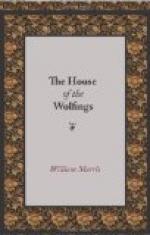But a little way from the mound of their own dead, toward the south they laid the Romans, a great company, with their Captain in the midst: and they heaped a long mound over them not right high; so that as years wore, and the feet of men and beasts trod it down, it seemed a mere swelling of the earth not made by men’s hands; and belike men knew not how many bones of valiant men lay beneath; yet it had a name which endured for long, to wit, the Battle-toft.
But the mound whereunder the Markmen were laid was called Thiodolf’s Howe for many generations of men, and many are the tales told of him; for men were loth to lose him and forget him: and in the latter days men deemed of him that he sits in that Howe not dead but sleeping, with Throng-plough laid before him on the board; and that when the sons of the Goths are at their sorest need and the falcons cease to sit on the ridge of the Great Roof of the Wolfings, he will wake and come forth from the Howe for their helping. But none have dared to break open that Howe and behold what is therein.
But that swelling of the meadow where the Goths had their overthrow at the hands of the Romans, and Thiodolf fell to earth unwounded, got a name also, and was called the Swooning Knowe; and it kept that name long after men had forgotten wherefore it was so called.
Now when all this was done, and the warriors of the kindreds were departed each to his own stead, the Wolfings gathered in wheat-harvest, and set themselves to make good all that the Romans had undone; and they cleansed and mended their Great Roof and made it fairer than before, and took from it all signs of the burning, save that they left the charring and marks of the flames on one tie-beam, the second from the dais, for a token of the past tidings. Also when Harvest was over the Wolfings, the Beamings, the Galtings, and the Elkings, set to work with the Bearings to rebuild their Great Roof and the other dwellings and booths which the Romans had burned; and right fair was that house.
But the Wolfings throve in field and fold, and they begat children who grew up to be mighty men and deft of hand, and the House grew more glorious year by year.
The tale tells not that the Romans ever fell on the Mark again; for about this time they began to stay the spreading of their dominion, or even to draw in its boundaries somewhat.
And this is all that the tale has to tell concerning the house of the Wolfings and the kindreds of the mark.
FOOTNOTES
{1} Welsh with these men means Foreign, and is used for all people of Europe who are not of Gothic or Teutonic blood.
{2} i.e. Foreigners: see note {1}
***End of the project gutenberg EBOOK the house of the Wolfings***




